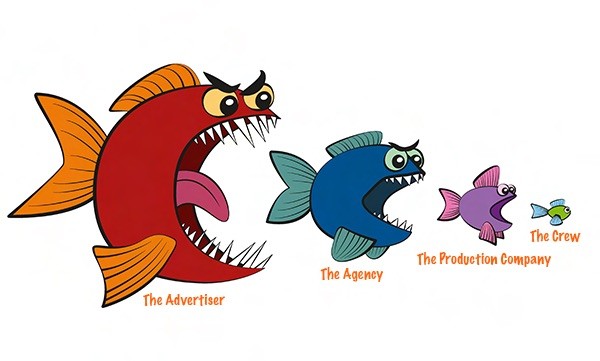Because of some sharp-eyed clients, we have noticed that a few production houses are making changes to their terms and conditions that will create a legal mess for agencies and their clients while increasing the opportunity for these production houses to increase their revenue from each client project.
The problem is that most agencies do not know this is happening. Or if they do, they are unaware of the legal mess they are creating. And it all has to do with who owns the intellectual property (IP) created at the time of the production of a television commercial or video.
What is happening?
Some production houses have tweaked their T&Cs to include clauses that give the production houses the IP rights to the work commissioned once the broadcast term has expired. This has been done by stealth, and there have been no industry announcements. In fact, TrinityP3 would not know about this if it were not for some of their sharp-eyed clients who asked our advice regarding the following clauses.
Clause: FILM COMPANY grants the Client a licence to use the Deliverables for the purposes, territories and time periods specified in the Proposal, subject to these terms and conditions. This licence permits the Client to use the Deliverables on the conditions set out in the clause below.
Clause:
(a) The Client shall receive master copies of the completed Deliverables once full payment of the Fee has been received, and the licence to use the Deliverables begins from the date of full payment of the Fee (except where FILM COMPANY otherwise gives express written permission).
(b) The licence does not apply to incomplete or draft Deliverables.
(c) The Client shall seek FILM COMPANY’S prior written consent for further use or re-use of the Deliverables, where that use falls outside the scope of the initial Agreement. FILM COMPANY shall not unreasonably withhold consent but may impose reasonable conditions governing the re-use of the Deliverables, including (without limitation) the payment of a reasonable usage fee.
(d) FILM COMPANY may suspend or revoke the licence if the Client fails to make any payment when due.
(e) This licence must not be assigned to any third party without FILM COMPANY’S prior written permission.
Clause: All Intellectual Property Rights in the Services (with the exception of any pre-existing Intellectual Property Rights in materials supplied by the Client) shall remain the property of FILM COMPANY. FILM COMPANY does not accept commissions to create copyright works other than to agree to licence Services developed and selected by FILM COMPANY for delivery to the Client. This overrides section 21(3) of the Copyright Act 1994 in accordance with section 21(4) of that Act.
TrinityP3 read the T&Cs and there hiding in plain sight was an additional clause that handed the IP of the TV commercial, produced on the client’s behalf, back to the production company once the FTA on-air use had expired due to talent or music rights expiring.
How is this different?
Traditionally, the client contract with the agency will include a clause that will secure and transfer all IP rights (and often moral rights) to the client. This includes the IP rights of the agency and any third party such as the production house, composers, illustrators, photographer and others. The clause will also mandate that if these rights cannot be secured or transferred to the client then the agency must inform the client in writing.
In the case of production house agreements, which are appended to the production house quote, this would include a clause that would transfer the IP rights for the masters to the client on the payment of the agreed fees. The masters are the files of the final commercial or commercials. In some cases, the transfer would also include all the working files including what was known as wild reels, select reels, transfer reels, A & B rolls and the like. In fact, all the components created as part of the production would become the property of the client.
But with these clauses in place, the production company maintains the IP ownership that is vested to them by law at the time of creation and simply provides a licence to the client to use these for a specific purpose and duration as set up in the quote form attached to the production company quote.
By accepting the film company quote the advertiser and their agency are accepting these terms and conditions. Therefore, the client will no longer own the products of the production.
Why does this matter?
Under these clauses, the IP from the production belongs to the production house. This is as it exists in law, that the producer owns the IP or more specifically the copyright. Except that the advertiser, the client of the agency will have a contract that requires the agency to secure the IP rights for the client.
But it appears this is not happening because these clause changes in the production house terms and conditions were not noted by the agency. They were instead spotted by the client who asked us what they meant.
What it means is that the agency has not secured the rights for their client and the client has a very specific licence to use the production produced by the production house for a very specific purpose and time.
In practical terms, it means if the original commissioner of the work, the advertiser, wants to use a particular shot from the footage (say a product shot) they would have to ask the production house for permission and pay a further licencing fee for the usage.
Why it is happening.
Production houses have been losing income for decades now, due to more competition and the shift of advertising spend from broadcast TV to online. Therefore, television commercial production budgets are tighter than ever and more considered before the money is committed.
In a world where the television commercial is no longer the largest part of the production spend, this is a tactic by the production house to command extra revenue from the agency and the client.
A whole new production industry has sprung up that produces digital media assets for the online social media industry. These producers provide fast and cheap creation of all types of video assets, including 6-second ads for use on social media. But they rely on the advertiser providing them with digital assets that the advertisers own.
It must be galling for production houses to see images from commercials they have lovingly crafted turn up in all sorts of online ads on TikTok, YouTube, Instagram, Facebook and the like and to know someone else is getting paid to make the thousands of variations from their original blockbuster production. So, it seems a few have decided to claim the IP rights of the production, not to protect their artistic vision, but to generate additional revenue they are currently losing to others.
What to do about it
If you are a client that contracts your agency to secure the IP rights for you, then it may be time to ask for an audit of recent productions to ensure the agency has not been accepting production company quotes with these new clauses. The onus is on the agency, in this situation, to secure these rights, or inform you when they cannot be secured and transferred to the advertiser.
If you are an advertiser who does not require your agency to secure the IP rights on your behalf, then you should be looking to develop or draft the appropriate clauses into your contracts, with both the agency and the companies they subcontract.
For all advertisers, it is worthwhile, as good practice, to ensure you see all financial paperwork relating to production procurement, including all quotes and terms and conditions. We recommend this for all our clients, which is why this issue was raised with us by two sharp-eyed clients.
At this stage, there is only a handful of production companies that have made these changes. But who really wants to get caught up in a legal dispute over copyright use and contract breaches, when a little housekeeping and governance can avoid the problem?




